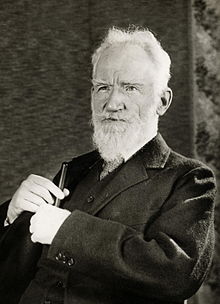
Back George Bernard Shaw Afrikaans ጆርጅ በርነርድ ሾ Amharic George Bernard Shaw AN جورج برنارد شو Arabic جورج برنارد شو ARZ জৰ্জ বাৰ্ণাৰ্ড শ্ব Assamese George Bernard Shaw AST George Bernard Shaw AVK George Bernard Shaw Aymara Corc Bernard Şou Azerbaijani
George Bernard Shaw | |
|---|---|
 Shaw in 1936 | |
| Born | 26 July 1856 Dublin, Ireland |
| Died | 2 November 1950 (aged 94) Ayot St Lawrence, Hertfordshire, England |
| Occupation | Playwright, critic, political activist |
| Nationality | Irish |
| Alma mater | Wesley College, Dublin |
| Genre | Satire, black comedy |
| Literary movement | Ibsenism, naturalism |
| Notable awards | Nobel Prize in Literature 1925 Academy Award for Writing Adapted Screenplay 1938 Pygmalion |
| Signature | |
George Bernard Shaw (26 July 1856 – 2 November 1950) was an Irish writer. He won the Nobel Prize in Literature in 1925.
His best known works are his plays, some of which were made into movies. He wrote many plays about political problems, and those polemic plays sometimes gave him enemies. For example, he wrote a play about prostitution, and another about women's rights.
His play Saint Joan was made into a movie in 1957.
His play Pygmalion was made into a movie twice. The first Pygmalion movie won him an Academy Award for the best adapted screenplay, 1938. Later, the play was also made into a musical play called My Fair Lady. The movie based on that musical won 8 Academy Awards in 1964.
Shaw was the first person to win both a Nobel Prize and an Academy Award.[1]
Shaw also wrote musical criticism using the pseudonym (made-up name) Corno di Bassetto (which means: Basset horn).
In 1962, his play Androcles and the Lion was printed in a two-language version. On one side of the book, the text is written using regular English. On the other side, it is written using the Shaw alphabet.
He also wrote a play called Caesar and Cleopatra.
- ↑ Gibbs, A. M. (2005). Bernard Shaw: a life (pp. 375–376). Gainesville, FL: University Press of Florida. p. 554. ISBN 0-8130-2859-0.